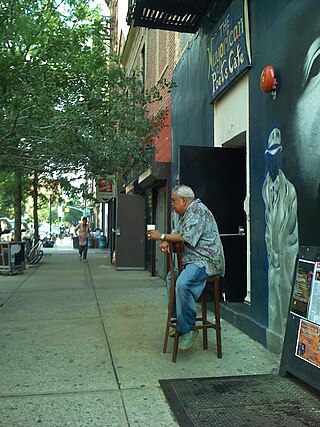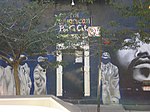
A poetry slam is a competitive art event in which poets perform spoken word poetry before a live audience and a panel of judges. While formats can vary, slams are often loud and lively, with audience participation, cheering and dramatic delivery.

Spoken word is an oral poetic performance art that is based mainly on the poem as well as the performer's aesthetic qualities. It is a 20th-century continuation of an ancient oral artistic tradition that focuses on the aesthetics of recitation and word play, such as the performer's live intonation and voice inflection. Spoken word is a "catchall" term that includes any kind of poetry recited aloud, including poetry readings, poetry slams, jazz poetry, pianologues, musical readings, and hip hop music, and can include comedy routines and prose monologues. Unlike written poetry, the poetic text takes its quality less from the visual aesthetics on a page, but depends more on phonaesthetics, or the aesthetics of sound.

Nuyorican is a portmanteau word blending "New York" and "Puerto Rican", referring to Puerto Ricans located in or around New York City, their culture, or their descendants. This term is sometimes used for Puerto Ricans living in other areas in the Northeastern US Mainland outside New York State as well. The term is also used by Islander Puerto Ricans to differentiate those of Puerto Rican descent from the Puerto Rico–born.

Miguel Piñero was a Puerto Rican born American playwright, actor and co-founder of the Nuyorican Poets Café. He was a leading member of the Nuyorican literary movement.

A poetry reading is a public oral recitation or performance of poetry. Reading poetry aloud allows the reader to express their own experience through poetry, changing the poem according to their sensibilities. The reader uses pitch and stress, and pauses become apparent. A poetry reading typically takes place on a small stage in a café or bookstore where multiple poets recite their own work. A more prominent poet may be chosen as the "headliner" of such an event and famous poets may also take the stage at a bigger venue such as an amphitheater or college auditorium.

The Nuyorican movement is a cultural and intellectual movement involving poets, writers, musicians and artists who are Puerto Rican or of Puerto Rican descent, who live in or near New York City, and either call themselves or are known as Nuyoricans. It originated in the late 1960s and early 1970s in neighborhoods such as Loisaida, East Harlem, Williamsburg, and the South Bronx as a means to validate Puerto Rican experience in the United States, particularly for poor and working-class people who suffered from marginalization, ostracism, and discrimination.

Miguel Algarín Jr. was a Puerto Rican poet, writer, co-founder of the Nuyorican Poets Café, and a Rutgers University professor of English.

Pedro Pietri was a Puerto Rican poet and playwright and one of the co-founders of the Nuyorican Movement. He was considered by some as the poet laureate of the Nuyorican Movement.

Bob Holman is an American poet and poetry activist, most closely identified with the oral tradition, the spoken word, and poetry slam. As a promoter of poetry in many media, Holman has spent the last four decades working variously as an author, editor, publisher, performer, emcee of live events, director of theatrical productions, producer of films and television programs, record label executive, university professor, and archivist. He was described by Henry Louis Gates Jr. in The New Yorker as "the postmodern promoter who has done more to bring poetry to cafes and bars than anyone since Ferlinghetti."
Beau Sia is an American slam poet.
Caridad de la Luz, a.k.a. "La Bruja", is a Nuyorican poet, playwright, actress and activist. She is considered one of the leading spoken word poets in the world. In 2005, El Diario La Prensa, the largest Spanish-language newspaper in New York City, named De la Luz as one of the "Fifty Most Distinguished Latinas in the United States".

The Nuyorican Poets Cafe is a nonprofit organization in the Alphabet City neighborhood of Manhattan in New York City. It is a bastion of the Nuyorican art movement, and has become a forum for poetry, music, hip hop, video, visual arts, comedy, and theater. Several events during the PEN World Voices festival are hosted at the cafe.

JesúsAbraham "Tato" Laviera was a Latino poet and playwright in the United States. Born Jesús Laviera Sanches, in Santurce, Puerto Rico, he moved to New York City at the age of ten, with his family, to reside in the Lower East Side. Throughout his life he was involved in various human rights organizations, but was best known as a renowned Nuyorican poet. An obituary for NBC Latino describes him as "one of the greatest representatives of the Nuyorican movement."

Jaime "Shaggy" Flores is a Nuyorican poet, writer and African Diaspora scholar who forms part of the Nuyorical literary movement.

SlamNation is a 1998 documentary film by director Paul Devlin. The film follows the National Poetry Slam in Portland, Oregon.
Victor Hernández Cruz is a Puerto Rican poet. In 1981, Life magazine named him one of America's greatest poets.
Sandra María Esteves is a Latina poet and graphic artist. She was born and raised in the Bronx, New York, and is one of the founders of the Nuyorican poetry movement. She has published collections of poetry and has conducted literary programs at New York City Board of Education, the Caribbean Cultural Center, and El Museo del Barrio. Esteves has served as the executive director of the African Caribbean Poetry Theater. She is the author of Bluestown Mockinbird Mambo and Yerba Buena. She lives in the Bronx.

Regie Cabico is a Filipino American poet and spoken word artist. He has been featured on two seasons of Def Poetry Jam on HBO and has been called the Lady Gaga of spoken word. He is an "out and proud" gay man.
José Angel Figueroa is a Puerto Rican poet, actor, author, editor, and a professor in the Humanities who has published poetry, fiction, and drama in the United States. He is best known for his poetry and is considered one of the first Neorican poets and contributed to the rise of the Nuyorican Literary movement. He was an early contributor to the Nuyorican Poets Café and has influenced the scene of Latino literature in New York through education, writing, and outreach.

Jesús Papoleto Meléndez, also known as "Papo", or "Papoleto", is a New York-born Puerto Rican poet, playwright, teacher, and activist. He is a member of the Nuyorican Movement. He grew up during the Civil Rights Movement, Black Power movement, and the emergence of the Nuyorican Movement in East Harlem. His titles include the play The Junkies Stole the Clock (1974), and Hey Yo/Yo Soy! 40 Years of Nuyorican Street Poetry.














